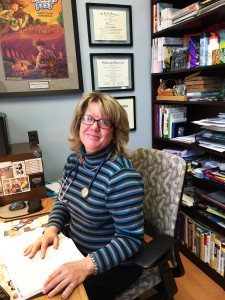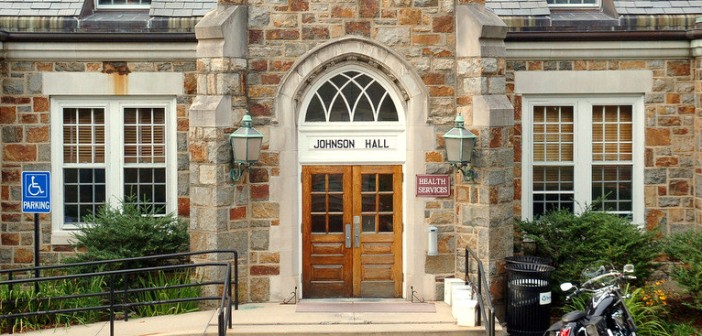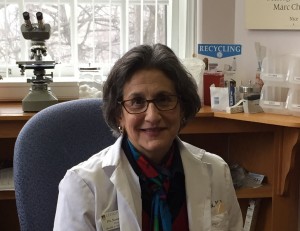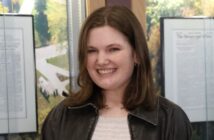
Karen Sicinski, a registered nurse in the health center, sits in her office in Johnson Hall. Sicinski started working at the health center in 1991 as a part-time nurse and became a full-time employee in 1997.
On the Lehigh University Health and Wellness Center’s official website a list of services available to students is present, along with descriptions of each. Commentary on hours, additional medical facilities in the area and what to do in case of a weather emergency also cloud this list.
Yet in a poll of 130 Lehigh students, the results suggested that not everyone on campus is completely aware of the services the health center can and cannot provide.
The survey asked students seven yes or no questions about the health center, in order to gauge their understanding of the services available to them. These questions included “Is the health center open on Saturdays?” “Does the health center provide gynecological services?” and “Can you have your blood drawn at the health center?”
No one question received the same answer across the board—in fact, in most cases the number of yes responses and the number of no responses were relatively close.
“It has always been a challenge to decide on the best way to communicate our services to students,” Karen Sicinski, a registered nurse at the health center, said in an email. “I am always surprised when someone tells me they didn’t know we were open on Saturdays or that the majority of our services come at no charge to the registered student.”
Indeed, 63 students answered that the health center was not open on Saturdays, while 67 said it was—the closest result of the survey.
According to Sicinski, who has been working at the health center full time since 1997, students are heavily encouraged to make an appointment at the health center Monday through Friday because that is when its hours are the longest and their staff is the largest. However, the center does remain open on Saturdays for urgent cases from 10 a.m. to 1:45 p.m. with one nurse available.
Jonathon Witt, ’15, was one of the students who responded no to the question of whether the center is open on Saturdays or not. He also said he was at a loss for whether the center offers gynecological services, or about which equipment they do and do not have.
“When I was taking the survey I was like, ‘I actually don’t know all of these answers,’” he said.
According to the health center’s website, the center provides annual gynecological exams for women on campus for a fee of $15. Through these exams the health center can also prescribe contraception, such as oral pills and injections, to patients. The center is also able to test for sexually transmitted diseases and conduct pap smears, both for a fixed cost.
In the student survey, 35 responded saying that the health center did not offer gynecological services, while 95 responded that they did.
Katherine Lavinder, an associate dean of students, reiterated Sicinski’s sentiment about communication with students.
“We run into this kind of communication gap because we know that students aren’t always checking their emails — they’re flooded with emails,” she said. “And the website — it’s important to have it accurate and up to date, but I think we’re constantly trying to think of ways we can do outreach and do better.”
Misconceptions
Aside from knowledge about services, Dr. Susan Kitei, the director of the health center, said in an email that many students are confused about the center’s ability to write medical excuses for students.
“One misconception is that our office provides medical excuses, although our medical excuse policy has been consistent over time and is clearly stated on our website,” Kitei said.
The policy states that the doctors and nurses who work at the health center do not write medical excuses for students when they miss class. Instead, students are expected to personally contact their professors, or acquire a dean’s note if they miss more than a full week or miss an exam.
“I believe that most professors are reasonable and realize that many illnesses that are significant enough that a student should not attend class do not necessarily require a health center visit,” Kitei said.
Lavinder frequently deals with administering the absence notification policy for students. This policy comes into play when students are forced to leave school for an extended period of time because of an illness.
Similar to Kitei’s statement about medical excuses, Lavinder said students who need a Dean’s note for missing class do not always have to go to the health center first.
However, Lavinder said there are times when the health center and the Office of the Dean of Students coordinate to help students who need an extended absence. This often happens when the health center tests a student for mono and the results are positive.
From there, the Office of the Dean of Students is notified, with the consent of the patient, and they step in to work with the student and faculty.
“That’s the most common way we interact,” Lavinder said.
Lavinder is also a member of the Gender Violence Response Advocates. She said her membership in this group also causes her to interact with the health center at times.
According to the Advocates’ website, the group is a “network of dedicated and compassionate staff and faculty members who are trained to assist survivors of gender violence.”
Lavinder said often times students who experience gender violence seek healthcare at the health center and advocates frequently accompany them.
Not only can the center provide immediate medical attention, but they can also give referrals to the survivors of places in the community that would be beneficial to them.
“They are an important partner for us,” Lavinder said.
Trained, personalized, professionals
According to Kitei, the average number of student visits to the health center over the past three academic years has been over 11,000 annually.
Witt said over the course of his four years at Lehigh, he has visited the health center multiple times and has had positive experiences each time.
One of these instances occurred when he sprained his foot while playing flag football.
Another instance occurred when Witt badly strained his back while playing an intramural sport. He said the center not only prescribed him medication to help with the pain, but they also advised him on specific stretches he could do to alleviate the spasm.
“It was like my own doctors at home,” Witt said. “They helped me out very well.”
The health center currently consists of 12 staff members—including one osteopathic physician, one medical doctor, two certified registered nurse practitioners, two registered nurses, one certified medical assistant and two administrative assistants.
The survey asked students if the medical personnel who work at the health center have the same qualifications as a primary care physician, or a physician one would see regularly at home. Thirty-three responded saying no, while 97 responded yes.
Kitei said all of the medical personnel working at the health center are licensed to practice in Pennsylvania.
“Doctors must have training in a primary care field of medicine,” she said. “Nurse practitioners must have their master’s degrees. All our nurses have bachelor’s degrees, and our full-time nurses are all accredited in ambulatory care nursing.”
The director of nursing at the health center also has her doctoral degree.
Kitei also said the staff, including the two administrative assistants, are CPR trained every two years.
Witt said one thing he was sure of while taking the survey was the health center had great doctors. When he sprained his foot, he felt no desire to go to St. Luke’s Hospital or another nearby hospital, rather than the health center.
“I knew if I went to the hospital I’d be waiting hours,” Witt said. “I knew if I went to the health center they’d have my health records, so it’d be quicker. I would feel like it was more personalized because I’m a Lehigh student. It’s a private hospital, basically. So why would I go to a public one?”
First-year outreach
Witt, who is a former Orientation Leader, said perhaps a stronger emphasis on health center services during orientation could help students gain a better understanding.
Allison Ragon, the assistant dean and director of the Office of First-Year Experience, said the orientation process used to include a mandatory tour of several buildings, including the health center. However, her office found that many students were not engaged in the process.
“Sometimes I don’t think students are ready to hear what those resources are because they don’t think they’ll ever use them,” she said.
Two years ago, however, the Office of First-Year Experience changed this aspect of orientation to an optional campus resource tour for students, which included the health center as one of the stops.
Each tour concentrates on five different tracks—the health center is part of the Identity track tour.
“We’ve seen about 500 students that opt in to do those tours and visit different offices and learn what they have to offer,” Ragon said.
The health center also offers several 5×10 programs for first-year students. During the first 10 weeks of freshmen year, students are expected to go to five programs on a list composed by the Office of First-Year Experience.
Lavinder and Ragon both said that their respective offices offer information sessions for parents of incoming students about the health center resources. The hope behind these sessions is that the parents will also have a hand in exposing their children to what the health center can do for them.
“I don’t know what the cure all is, but what we’re trying to do is talk about it in a lot of different settings,” Lavinder said.







Comment policy
Comments posted to The Brown and White website are reviewed by a moderator before being approved. Incendiary speech or harassing language, including comments targeted at individuals, may be deemed unacceptable and not published. Spam and other soliciting will also be declined.
The Brown and White also reserves the right to not publish entirely anonymous comments.